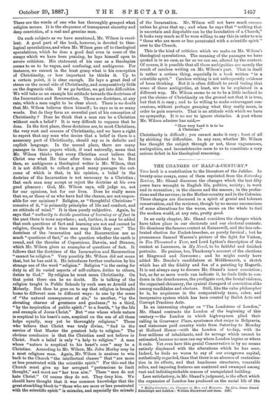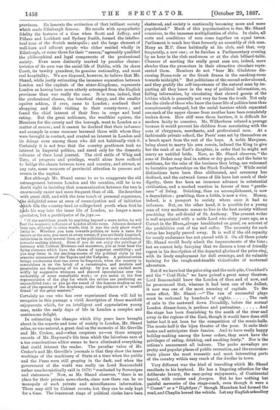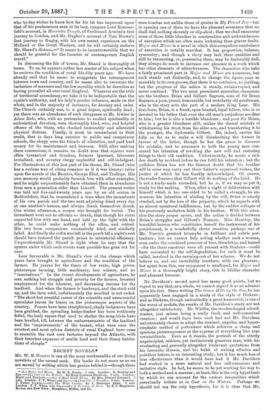THE CHANGES OF HALF-A-CENTURY.* Tins book is a contribution to
the literature of the Jubilee. In twenty.nine essays, some of them reprinted from the Saturday Review, Mr. Shand discusses the changes which the last fifty years have wrought in English life, politics, society ; in work and in recreation ; in the classes and the masses; in the profes- sions and the services ; in the Mother-country and in the Colonies. These changes are discussed in a spirit of genial and tolerant conservatism, and the reviewer, though by no means unconscious of some alterations for the worse, seems on the whole to find the modern world, at any rate, pretty good.
In an early chapter, Mr. Shand considers the changes which have taken place in our electorate and our electoral contests. He dismisses the famous contest. at Eatanswill, and the less cele- brated election for Pocket-breeches, as purely farcical ; but he pronounces Samuel Warren's picture of the fight for Yatton, in Ten Thousand a Year, and Lord Lytton's description of the contest at Lansmere, in My Novel, to be faithful and finished portraits. He praises, too, Thackeray's account of the elections at Ringwood and Newcome ; and be might surely have added Mr. Brooke's candidature at Middlemarch, a sketch which has all the fidelity and fun of a painting by Hogarth. It is not always easy to discern Mr. Shand's inner conviction ; but, as far as mere words can indicate it, he finds little to con- demn in the drunkenness, the profligate cost, the brutal violence, the organised chicanery, the cynical disregard of conviction alike among candidates and electors. Still, like the calm philosopher he is, he acquiesces in the comparatively tame, sober, and inexpensive system which has been created by Ballot Acts and Corrupt Practices Acts.
In an interesting chapter on "The Loadatone of London," Mr. Shand contrasts the London of the beginning of this century —the London in which highwaymen plied their calling in Grosvenor Place, sportsmen shot snipe in Belgravia, and statesmen paid country visits from Saturday to Monday at Holland House—with the London of to-day, with its four millions of inhabitants, and its acreage which cannot be estimated, because no man can say where London begins or where it ends. Yet even here this genial Conservative is by no means entirely displeased with the alterations which he has seen. Indeed, he finds no worse to say of our overgrown capital, resthetically regarded, than that there is an absence of centralisa- tion in its effects, and that handsome structures, venerable relics, and imposing features are scattered and swamped among vast and indistinguishable masses of unregulated building.
Less satisfactory, in Mr. Shand's judgment, is the effect which the expansion of London has produced on the social life of the • ffalf-a-Century ; or, Changes in Men and Manners. By Sloe. Dines Shand Edinburgh and London Wiliam Blackwood and so,,.. 1887.
provinces. He laments the extinction of that brilliant society which made Edinburgh famons. He recalls with sympathetic fidelity the features of a time when Scott and Jeffrey, and Pinang and Lockhart and Sydney Smith, formed the intellec- tual tone of the Scotch metropolis ; and the large element of well-born and affluent people who either resided wholly in Edinburgh, or came there for their "season," agreeably qualified the philosophical and legal components of the professional society. Even more distinctly marked by peculiar charac- teristics of its own was the social life of Dublin, with its sham Court, its tawdry grandeur, its genuine nationality, and most real hospitality. We are disposed, however, to believe that Mr. Shand, while justly estimating the immense separation between London and the capitals of the sister-Kingdoms, represents London as having been more utterly estranged from the English provinces than was really the case. It is true, indeed, that the professional classes, the beneficed clergy, and the smaller squires seldom, if ever, came to London ; confined their shopping and their visiting to their county-town; and found the chief interest of their lives in crops and local rating. But the great noblemen, the wealthier squires, the Members for the county and the borough, went to London as a matter of course; and it cannot be doubted that their influence and example in some measure leavened those with whom they were brought in contact, and created an interest in London and its doings even among those who did not habitually visit it. Certainly it is not true that the country gentlemen took no interest in Imperial polities, and eared only for the domestic columns of their local journal. The civil strife of Whig and Tory, of progress and privilege, would alone have sufficed to bridge the chasm between town and country, and attract, at any rate, some measure of provincial attention to persons and events in the capital.
But although Mr. Shand seems to us to exaggerate the old estrangement between London and the counties, still he is no doubt right in insisting that communication between the two is enormously easier and more frequent than of old. He describes - with great skill, and with the true touch of personal experience, )
he delightful senile at once of emancipation and of initiation hich fills the country-bred or college-bred youth when first he fi ds his way into the inner life of London, no longer a mere s,pectator, but a participator of its joys i- I "If the ambitious yonth be anything beyond a mere trifler, be will free; the magnetic influence of London all the more. Johnson declared long ago, although in other words, that it was the only place worth living in. Whether you turn towards politics, or have a taste for letters or the arts, you meet at every corner, if you are fairly launched, celebrities in their several lines, or the politicians who are contributing towards making history. Even if you do not enjoy the privilege of intimacy with Cabinet Ministers and statesmen, you at least hear the flying rumours which have the charm of apparent credibility ; and you may listen in the smoking-rooms of the political clubs to the oracular utterances of the Tapers and the Tadpoles. A political crisis brings excitement that can never be forgotten, when the country in convulsions is on the brink of a catastrophe, and patriots and pessimists are despairing of its safety. Or you are excited more wildly by suggestive whispers and shrewd speculations over the authorship of some remarkable work ; or you assist at the first representation of the play for which the critics are predicting an unparalleled run ; or you go the round of the famous studios on the eve of the opening of the Academy, under the guidance of a ' candid friend' of the great masters."
Certainly no one who has ever experienced them will fail to recognise in this passage a vivid description of those manifold enjoyments which, for an intelligent and appreciative young man, make the early days of life in London a complex and continuous delight.
In estimating the changes which fifty years have brought about in the aspects and tone of society in London, Mr. Shand relies, as was natural, a great deal on the memoirs of Mr. Greville and Mr. Croker, and—what surprises us—on those scrappy records of Mr. Hayward's life from which the laborious care of a too conscientious editor seems to have eliminated everything that could interest the reader. The peculiar value of Mr. Croker's and Mr. Greville's journals is that they show the inner workings of the machinery of State at a time when the public and the Press were still groping in the dark, and when the government of the world was really (as Lord Beaconsfield rather anachronistically said in 1878) "conducted by Sovereigns and statesmen." Now, as Mr. Shand observes, "there is no place for their private news-sheets, since now there can be no monopoly of such private and miscellaneous information. There may still be Cabinet secrets, but they can be only kept for a time. The innermost rings of political circles have been shattered, and society is continually becoming more and more popularised." Much of this popularisation is due, Mr. Shand conceives, to the immense multiplication of clubs. In clubs, all sorts and conditions of men come together on equal terms. Parliament is much less than formerly an assembly of rich men. Many an M.P. dines habitually at his club, and that, very frequently, a new one ; or he finishes a Parliamentary evening by an hour in the club card-room or at the club billiard-table. Chances of meeting the really great men are, indeed, more slender than the promoters in their attractive circulars repre- sented them. Members do not "hear Mr. Gladstone dis- cussing Home-rule or the Greek drama in the smoking-room towards midnight." But politicians of the second order abound, and they gratify the self-importance of the natural man by im- parting all they know in the way of political information, or, failing information, by circulating that shrewd gossip of the lobbies which is generally not very far from the truth. Not only has the circle of those who know the inner life of politics been thus conspicuously enlarged, but the social barriers which separated one rank of the upper classes from another have been completely broken down. How stiff were those barriers, it is difficult for modern laxity to conceive. Mr. Wilberforce refused a peerage because it would prevent his children from associating with the sons of clergymen, merchants, and professional men. At a fashionable private school, the Peers' sons sat by themselves on a bench apart from the rest of the boys. A noble Marquess, being about to marry his own cousin, induced the King to give her the rank of an Earl's daughter, in order that he might not marry an untitled bride. Now, as Mr. Shand observes, "the sons of Dukes may deal in cotton or dry goods, and the heirs to earldoms, for the sake of the business they bring, are welcomed to lucrative partnerships on the Stock Exchange." While social distinctions have been thus obliterated, and ceremony has declined, and, the outward forms of life have lost much of their dignity, there has been an immense advance in substantial civilisation, and a marked reaction in favour of true " gentle- ness " of living. Drinking, then an accomplishment, is now a degradation ; gambling, then a foible, is now a vice. Money, indeed, is a passport to society where once it had no inilnence. But, on the other hand, it is possible for a young man of very moderate means to live in the best society without practising the self-denial of St. Anthony. The present writer is well acquainted with a noble Lord who sixty years ago, as a Cornet in the Blues„always breakfasted on gruel, on account of the prohibitive cost of tea and coffee. The necessity for such virtue has happily passed away. It is well if the old capacity for manly endurance has not passed with it. On all these points Mr. Shand would freely admit the improvements of the time ; but we cannot help fancying that we discern a tone of friendly regret in his description of the departed glories of the prize-ring, with its lively employment for dull evenings, and its valuable training for the rough-and-tumble vicissitudes of nocturnal adventure.
But if we have lost the prize-ring and the cock-pits, Crockford's and the "Coal-Hole," we have gained a great many theatres. Lord Beaconsfield knew the London of then and of now, and he pronounced that, whereas it had been one of the dullest, it now was one of the most amusing of capitals. To the same effect, Mr. Shand The run of successful plays must be reckoned by hundreds of nights The rush of cabs to the eastward down Piccadilly, before the normal
London dinner-hour, is perilous and portentous And the stage has been flourishing to the south of the river and away in the regions of the East, though it would have done still better had it not been for the competition of the music-halls. The music-hall is the bijou theatre of the poor. It snits their tastes and anticipates their fancies. And to have really happy holiday-making among the lower orders, they must have the privileges of eating, drinking, and smoking freely." Nor is the artisan's amusement all indoors. The parks nowadays are pretty and popular places of public recreation, and the excursion. train places the most romantic and most interesting parts of the country within easy reach of the dweller in town.
Very different was the kind of travelling which Mr. Shand recollect, in his boyhood. He has a lingering affection for the deliberate luxury, the easy-going enjoyments, of Continental travel, with courier and fourgon. But he has nothing but painful memories of the stage-coach, even though it were a "Comet" or a "Highflyer ;" though Macadam had formed the road, and Chaplin horsed the vehicle. Let any English schoolboy
who to-day wishes to know how far his lot has improved upon that of his predecessors even at its best, compare Lord Beacons- field's account, in Henrietta Temple, of Ferdinand Armine's first journey to London, and Mr. Hughes's account of Tom Brown's first journey to Rugby, with his own recent experience on the Midland or the Great Western, and he will certainly endorse Mr. Shand's dictum,—" It seems to be incontrovertible that we should be grateful for the luxuries of contemporary English travel."
In discussing the life of towns, Mr. Shand is thoroughly at home. To us, he appears rather less master of his subject when he reviews the condition of rural life fifty years ago. We have already said that he seems to exaggerate the estrangement between town and country, and he seems also to overstate the barbarism of manners and the low morality which he describes as having prevailed all over rural England. Whatever are the evils of territorial ascendency, we take it to be indisputable that the squire's authority, and his lady's gentler influence, made on the whole, and in the majority of instances, for decency and order. The Church certainly was, to a great degree, spiritually dead; yet there was an abundance of such clergymen as Mr. Irwine in Adam Bede, who, with no pretensions to exalted spirituality or ecclesiastical devotion, were thoroughly kind, wise, and helpful officers of the State, who checked immorality and alleviated physical distress. Finally, it must be remembered to their credit, that in days long anterior to public and compulsory schools, the clergy were the friends of education, and paid hard money for its maintenance and increase. Still, after making these concessions, it remains no doubt true that squires were often tyrannical and drunken, farmers ignorant, labourers brutalised, and country clergy neglectful and self-indulgent. For illustrations of this last part of his theme, Mr. Shand (who has a curious way of citing romance as if it was history) relies upon the novels of the Brontës, George Eliot, and Trollope. His own memory would probably furnish him with other examples, and he might unquestionably have obtained them in abundance from men a generation older than himself. The present writer was told not five.and-twenty years ago by an old sexton in Bedfordshire, that he remembered a time when the incumbents of his own parish and the two next adjoining dined every day at one another's houses, and always drank themselves drunk. One winter afternoon, a corpse was brought for burial. The incumbent went out to officiate HO drunk, that though his sister supported him with one hand, and held up the light with the other, he could make nothing of the office, and retired. His two boon companions successively tried, and similarly failed. And finally the coffin was left in the porch till a night's rest should have restored the parish priest to ministerial efficiency. Unquestionably Mr. Shand is right when he says that the system under which such events were possible has gone out for ever.
Less favourable is Mr. Shand's view of the change which years have brought in agriculture and the condition of the farmer. He yearns for the times of low rents, high prices, picturesque farming, little machinery, less science, and no "innovations." In the recent developments of agriculture, he sees nothing but struggle and poverty for the farmer, lessened employment for the labourer, and decreasing income for the landlord. And when the farmer is bankrupt, and the stock sold up, and the farm relet, unfortunately the mischief is not ended. "The short but eventful career of the scientific and unsuccessful speculator leaves its traces on the picturesque aspects of the country. Fences have been straightened, shady hedgerows have been grabbed, the spreading hedge-timber has been ruthlessly felled, the leafy copses that used to shelter the song-birds have been levelled, till, between the embarrassments of the landlord and the 'improvements' of the tenant, what were once the sweetest and most sylvan districts of rural England have come to resemble the vast corn factories beyond the Atlantic, with their fenceless expanses of arable land and their flimsy habita- tions of shingle."




































 Previous page
Previous page